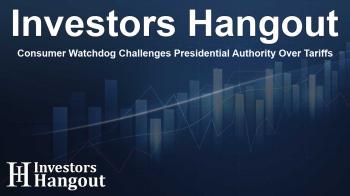Consumer Watchdog Challenges Presidential Authority Over Tariffs

Consumer Watchdog Raises Concerns Over Presidential Tariff Powers
Consumer Watchdog has recently taken a significant step by filing an amicus curiae brief in the U.S. Supreme Court. The organization is advocating for the Justices to reconsider President Trump's expansive use of "emergency" tariffs. This urgent request reflects growing fears about unchecked presidential powers under the International Emergency Economic Powers Act (IEEPA), which could harm consumers financially and undermine the balance of power established in the Constitution.
Challenging the Constitutionality of Tariffs
This nonprofit, non-partisan group focuses on consumer protection and is joined by prominent figures like constitutional law expert Alan B. Morrison from George Washington University and international trade attorney R. Will Planert from Morris Manning & Martin LLP. Together, they are supporting legal challenges in cases like Learning Resources v. Trump and Trump v. V.O.S. Selections. These cases question whether a President can impose such significant tariffs unilaterally by simply declaring a national emergency.
Impacts of Tariffs on Everyday Consumers
Harvey Rosenfield, the founder of Consumer Watchdog, voiced strong concerns about the implications of IEEPA. He emphasized that if this act permits a President to impose tariffs at will on any product and in any amount, it effectively gives the Executive Branch a blank check, which fundamentally contradicts constitutional principles. Rosenfield stated, "Only Congress has the authority to tax the American people. The Court must set a limit on this power." This reflects a critical view that highlights the potential financial burden on everyday consumers.
Why Tariffs are Viewed as Taxes
The brief provided by Consumer Watchdog makes several key arguments regarding tariffs being regressive taxes that can lead to increased costs for essential household items. This creates an uneven burden, significantly impacting working families and small business owners. The organization argues that such tariffs disproportionately affect those who are already struggling financially.
The Lack of Guidelines in IEEPA
One of the main contentions raised is that IEEPA fails to offer clear guidelines, lacking an "intelligible principle" that would limit the President's ability to create, modify, or eliminate tariffs. There are no set standards regarding the rates or duration of these tariffs, nor is there any mechanism for judicial review, which raises serious concerns about the potential for abuse of power.
Legal Precedents and Consumer Impact
Recent legal cases, including FCC v. Consumers' Research, have stressed the necessity for Congress to establish clear parameters when entrusting economic powers. However, IEEPA is criticized for not providing such boundaries. William Pletcher, Litigation Director at Consumer Watchdog, highlighted that these tariffs have already resulted in nearly $90 billion in hidden taxes, which consumers are bearing. Pletcher emphasized the need for the Supreme Court to reaffirm that the power to tax rests solely with Congress, asserting that there is no reasonable justification for circumventing the separation of powers.
Consumer Watchdog's Advocacy History
Consumer Watchdog has previously submitted briefs in lower courts, expressing that the expansive powers granted to the President under IEEPA ultimately lead to higher consumer prices and infringe upon Article I, which prevents excessive delegation of legislative authority. The appellate courts have upheld that the President does not possess the requisite statutory authority to impose these tariffs, prompting the administration to appeal to the Supreme Court. The outcome of this case could set a crucial precedent for the future of economic governance.
Looking Ahead
With a decision anticipated in 2026, all eyes are on the Supreme Court as the implications of this case could resonate widely across the country. Consumer Watchdog continues to stand at the forefront of this critical constitutional challenge, advocating for the rights of consumers and the principles of democracy.
Frequently Asked Questions
What is the main argument of Consumer Watchdog's brief?
The brief argues that the President should not have the unchecked authority to impose tariffs under IEEPA, as it violates the separation of powers and harms consumers.
How do tariffs affect everyday consumers?
Tariffs can act as hidden taxes, increasing prices on essential goods and disproportionately affecting working families and small businesses.
What legal precedents support the challenge against tariffs?
Recent cases, such as FCC v. Consumers' Research, emphasize that Congress must set clear limits on any economic power delegated to the Executive Branch.
When is the Supreme Court expected to make a decision?
The Supreme Court is expected to announce its decision on the matter in 2026.
What steps has Consumer Watchdog taken regarding this issue?
Consumer Watchdog has filed briefs in both lower courts and the Supreme Court to argue against the constitutionality of tariffs imposed under IEEPA.
About The Author
Contact Dylan Bailey privately here. Or send an email with ATTN: Dylan Bailey as the subject to contact@investorshangout.com.
About Investors Hangout
Investors Hangout is a leading online stock forum for financial discussion and learning, offering a wide range of free tools and resources. It draws in traders of all levels, who exchange market knowledge, investigate trading tactics, and keep an eye on industry developments in real time. Featuring financial articles, stock message boards, quotes, charts, company profiles, and live news updates. Through cooperative learning and a wealth of informational resources, it helps users from novices creating their first portfolios to experts honing their techniques. Join Investors Hangout today: https://investorshangout.com/
The content of this article is based on factual, publicly available information and does not represent legal, financial, or investment advice. Investors Hangout does not offer financial advice, and the author is not a licensed financial advisor. Consult a qualified advisor before making any financial or investment decisions based on this article. This article should not be considered advice to purchase, sell, or hold any securities or other investments. If any of the material provided here is inaccurate, please contact us for corrections.

